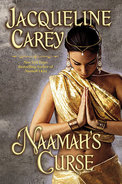
| Series: | Naamah #2 |
| Publisher: | Grand Central |
| Copyright: | June 2010 |
| ISBN: | 0-446-19805-6 |
| Format: | Hardcover |
| Pages: | 567 |
Naamah's Curse is a direct sequel to Naamah's Kiss, and while there's enough of a recap of the previous book that you could start here without too much confusion, I wouldn't read the series out of order. Having a prior introduction to Moirin helps provide emotional grounding to the story and give it more force. Carey is also unfortunately very bad at weaving a recap of the previous novel into the book, so remembering the story lets you skim through a lot of clunky and repetitive introduction.
Sadly, the start of this book is weak. Much of that is because of the painfully forced recaps, but it's also slow to gain any emotional edge (which is what Carey is the best at writing), leaving the reader less shielded from the loose and discursive style. Carey is not one of the better sentence-by-sentence writers in the fantasy field, and either the start of the book was less well-written than most or I wasn't yet in the mood for her style. Up until Moirin gets to the nomad gathering, everything that happens is rather predictable and slow-moving and becomes a bit tedious in its reinforcement of how wonderful Moirin is.
Carey gets the story going, however, with a gut punch of a scene that affected me far more strongly than I expected, and from that point on the book is either much stronger or much better at pressing my buttons (it can be hard to tell which with a highly emotional, character-driven author). I really like Moirin in a way that I rarely feel with series protagonists, and Carey is very good at wrapping me up in her emotional reactions and getting me to care about what happens to her. I put Naamah's Curse down for the night after the gut-punch twist, then stayed up all night reading most of the rest of the book in one sitting.
Any protagonist of a story set in this world has to measure up against Phèdre, who is a remarkably hard act to follow. I liked the second trilogy with Imriel, but not as much, largely because I never cared about Imriel the same way. In Moirin, Carey has a heroine who is nearly as engaging as Phèdre but in a completely different way. That was apparent from Naamah's Kiss, but it's made glaringly obvious here: Carey puts Moirin through things that would have provoked entirely different reactions from Phèdre. Instead of driving the story through politics, responsibility, and duty, Moirin's reactions are shaped by love, delight, and spirituality. I'm finding it increasingly fascinating to see how differently the perspectives shape the world and the available solutions to problems.
Along those lines, Carey moves back onto firmer cultural ground for much of this book, taking as the subject material a religious conflict rooted in European ideas of religion. After an episode in China that felt a bit stereotyped, I was glad to see this. One of the strengths of this larger series has always been Carey's handling of religion: the impact of both the reality of every branch of religious experience and the alterations to world history caused by Blessed Elua and Terre d'Ange. In this book, the religious conflict turns into a bit of a broadside against traditional Christian morality, but one cares so much about Moirin and her motives and approaches that it's charming rather than polemical. I might have wrinkled my nose if I'd known in advance that much of the book is an extended religious debate, but I would have been wrong to doubt. The thoughts are not particularly deep intellectually, but Carey delivers them with an emotional strength that makes it engaging story-telling for me.
It wouldn't be a fat fantasy novel without some map exploration, however, and there still is a bit of that. This time, the destination is the Himalayas, with a brushing encounter with Hindu gods. India itself stays off-screen; the characters stop in a mountain land that I assume was modelled after either Tibet or Nepal (it's about the right spot in the map for it). Here, as with China, there were a few too many stereotypes for my taste. Carey takes bits from Tibetan Buddhism (I think), makes the Hindu caste system a significant part of the story, and takes full advantage of the aura of exoticism that most western readers see around Tibet and Nepal. While the outcome fits Moirin thematically, I suspect those familiar with the doctrines of either Buddhism or Hinduism are going to be cringing a bit at the simplifications here. Given the focus in this series on exploring religion, I can see the deep attraction to visiting a wide variety of countries, but Carey is on much firmer ground when writing about western religion. (And I wish I weren't anticipating a noble savage train wreck when the characters inevitably end up in North America, as was heavily hinted at in Naamah's Kiss.)
All that being said, I could barely put this book down, including the end portion in the Himalayas. This is all backdrop against the sort of dramatic emotional story that Carey loves to tell, and Moirin is delightful throughout. Carey does a great job building a warm-hearted, impulsive, occasionally impish character who makes up for her lack of Phèdre's political skills with a well-handled subtle magic and a determination to do the right thing and see the best in as many people as she can. If you liked Naamah's Kiss, definitely read on; this is as good of a book, probably a bit better.
Followed by Naamah's Blessing.
Reviewed: 2010-09-28